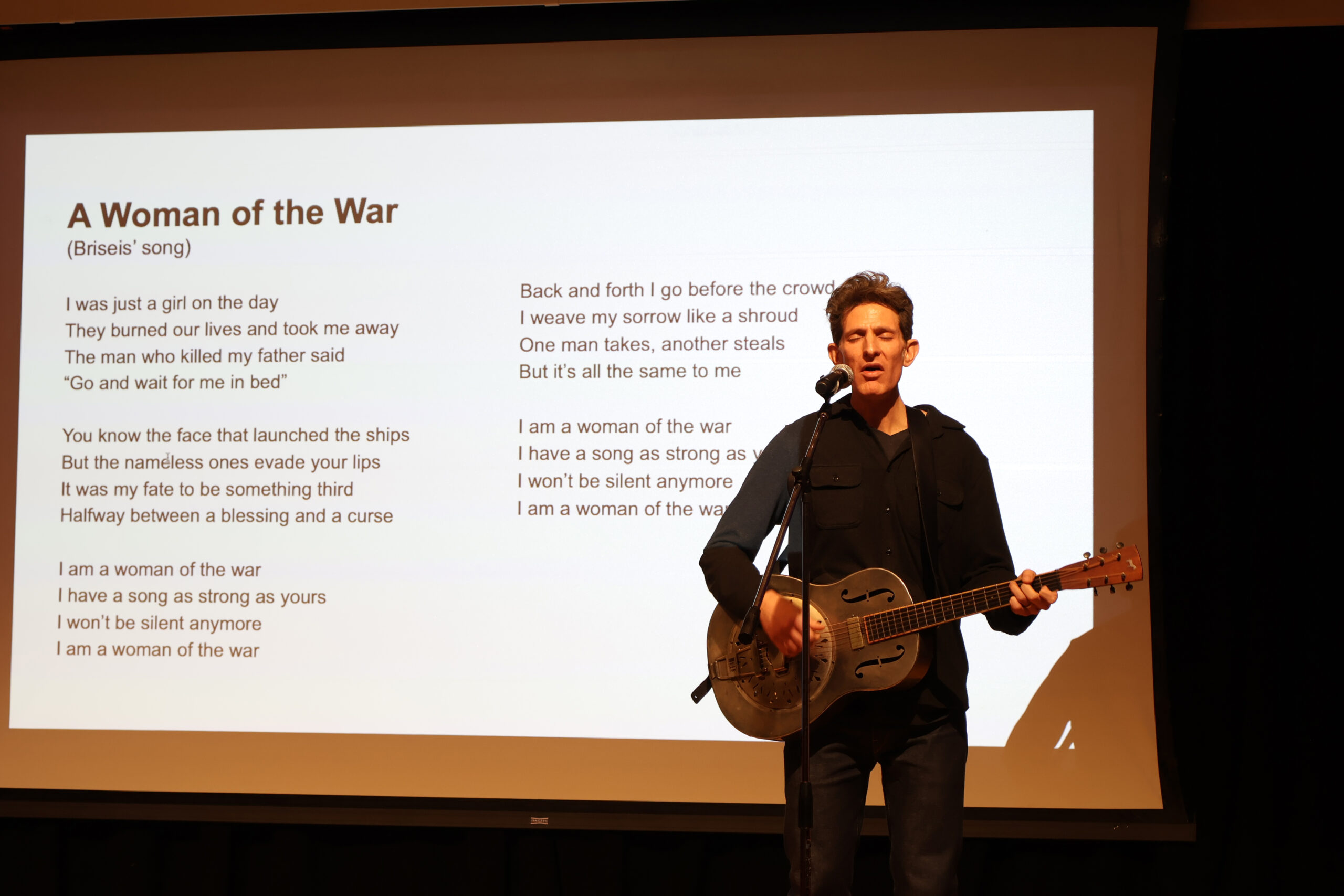Joe Goodkin performs “The Blues of Achilles,” musical adaptation of “The Iliad”
February 14, 2025
 Abigail Hebert
Abigail HebertOn Wednesday, the Music Department and the Department of Classics welcomed Joe Goodkin, a Chicago-based musician and composer of “The Blues of Achilles,” an award-winning musical adaptation of “The Iliad.” The album is a collection of 17 original songs, arranged for guitar and vocals, which signify the stories of characters such as Achilles, Patroclus, Briseis, Helen, Priam and others.
Michael Nerdahl, a senior lecturer in classics, organized the event and invited Goodkin to give his students fresh insight into different interpretations of classical works.
“I just really wanted the students to see the other possibilities of what it means to read ‘The Iliad,’ or really any text, and to see what happens when it is brought into a different realm,” Nerdahl said.
Following the performance, Goodkin discussed topics such as love, humanity and the tragedies portrayed in both the ancient Greek epic and his album.
“Every bad thing that happens between humans in the world is connected to seeing humans as non-human: dehumanizing,” Goodkin said. “The tradition of epic, which is getting in a room with a bunch of people and singing about it and feeling it and having a collective experience, is as good a tool as there ever is that’s come into being. And that’s why we still do it today.”
Goodkin described the process of creating “The Blues of Achilles” as a challenging yet eye-opening experience.
“I think the writing process was me discovering that there was more love in the story than I thought there was,” Goodkin said. “Glory is often in conflict with that caretaking. When I finished it and I had all these love songs, I thought I had done something wrong. I was like, ‘This is not what a war is, this is not what I was expecting to find.’”
Classics major Sam Turrigiano ’26 is passionate about ancient Greek literature. He appreciates how artists retell timeless stories in different ways, allowing them to be enjoyed by new audiences.
“The joke that was going around last year about someone always thinking about the Roman Empire is me,” Turrigiano said. “The idea that we’re telling a story in a different way, but the same story that we’ve been telling for 3,000 years now, it’s just so cool. There’s something about it that makes all of us want to listen to it again and again and again.”
Goodkin believes that modern musical interpretations of classical myths create human connection when the stories are appreciated as human experiences first rather than as Ancient Greek and Roman tales.
“Some people do it backwards,” Goodkin said. “They want to learn everything about the culture, and they get lost in the weeds of these specific things, but I think if we move up a level and look at what makes the stories human, and then we say, ‘Well, what makes these human stories specifically ancient Greek or Roman?’ I think that’s a better way to learn about what it meant to be in ancient Greece.”
Goodkin emphasized that music as a medium can bring “The Iliad” to life in a unique and powerful way by creating an emotional, communal experience.
“Music goes into the brain and accesses emotions and feelings in a different way than text does,” Goodkin said. “Reading a text is generally a solitary experience. Even if you go discuss it, you’re having that experience by yourself. When you take in a music performance or any sort, you’re having your reaction, and then you’re having your reactions to everybody else’s reactions in real time.”
Ian Alexander Schael Aponte ’28, who plays guitar, appreciated the emotions that Goodkin’s music evoked among audience members.
“I was personally very moved during the song about Patroclus’s death, with Achilles avenging him and talking to his soul that has already left,” Aponte said. “It was a great way of connecting those emotions to people who normally wouldn’t see them that way.”
Goodkin’s goal is to bring the classic stories to life in a way that inspires his audience, inviting them to revisit and discover the works with an appreciation for their depth and complexities. He also hopes to challenge his audience’s assumptions about the nature of war stories through his musical interpretations.
“I hope people are surprised by my telling. I hope they see more tenderness and love in war or in the relationships in war, and I hope I challenge some of their assumptions about the characters and about what a war story can be,” Goodkin said.
Sam Turrigiano ’26 is a columnist for the Bowdoin Orient for spring 2024.

Comments
Before submitting a comment, please review our comment policy. Some key points from the policy: